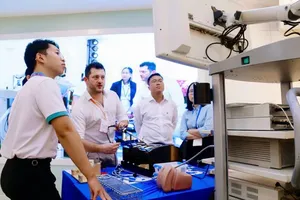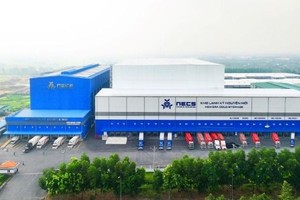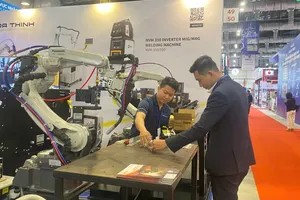
The Indian Executive Vice President shared this information at the International Workshop on Creative Explosion with Virtual Studio Technology held in Ho Chi Minh City yesterday.
According to him, the global virtual studio market is predicted to increase from only $2.98 billion in 2023 to $7.62 billion by 2030, with a compound annual growth rate of 14.4 percent during this period.
The event was co-organized by the MAAC Academy of Film and Animation - a Media & Entertainment education brand of Aptech Company, Arena Multimedia, and Aptech Group (India), with the participation of domestic and international experts, some film producers, and hundreds of students interested in this field.
Referring specifically to the Indian market, Indian Executive Vice President Abir Aich cited data from a new report by Grand View Research, Inc., indicating that the virtual production market in India is expected to reach $507.1 million by 2030, with an annual compound growth rate of 22 percent from 2023 to 2030.
According to the Aptech representative, virtual production workflow is becoming increasingly popular in the film and television industry. During the pre-production stage, filmmakers create detailed virtual environments, characters, and props for the final product. Once pre-production is complete, filmmakers move on to the production stage, where real actors interact with virtual characters and environments using motion capture and virtual cameras. This stage is crucial to the final product’s success, as it allows filmmakers to bring their virtual world to life and create a truly immersive experience for the viewer. It is a blend of traditional filmmaking with real-time CGI image simulation and digital technology systems, creating an interactive and engaging environment for visual storytelling.
More and more filmmakers are choosing virtual studios for their efficiency and convenience. For example, many blockbuster visual effects films have adopted this technology, from TV series like The Mandalorian (2019), House of the Dragon (2022), Percy Jackson and the Olympians (2023), to major films like Thor: Love and Thunder (2022), Top Gun: Maverick (2022), Black Adam (2022), and Megalopolis (2024).
Although this technology is still relatively new in the Vietnamese market, it has also been applied in film production, notably in some scenes in the two films including Lat mat 6: Tam ve dinh menh ( Face Off 6: The Ticket Of Destiny) and Lat mat 7: Mot dieu uoc ( Face Off 7: One dream)
According to Mr. Abir Aich, the use of virtual studios in producing TV series or films is beneficial for several reasons. This approach not only enhanced the visual fidelity of the show but also streamlined the production process, allowing for greater creative freedom and flexibility, saving time and costs, reducing the need for a physical location, increasing flexibility and repeatability, and enhancing collaboration.

Agreeing with the opinion, founder of LumiGrade Media Tran Hoang Hai stated that virtual studio technology is contributing to changing the current filmmaking process.
Previously, traditional film production had to go through stages such as scriptwriting, pre-production, production, post-production, and release.
With the present virtual studio technology, the pre-production phase integrates design, 3D construction, and effects; thereby, reducing the workload for the production and post-production phases.
Mr. Hai mentioned that with this technology, film crews can create 5-7 different scenes, from forests to seas, in just one day, minimizing risks to the maximum extent meanwhile without this technology, this requires meticulous preparation in the pre-production stage.
According to some Vietnamese experts in this field who attended the workshop, despite its potential, the application of virtual studios in practice still faces many challenges. This technology is relatively new and requires more time to build trust and convince directors and producers.













)










